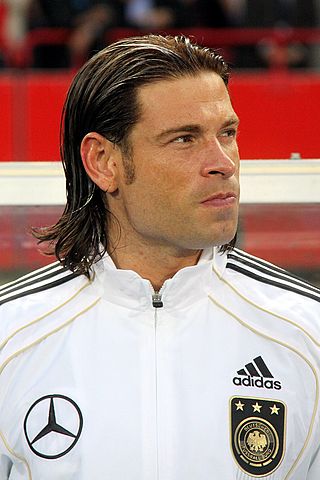The 2003–04 Bundesliga was the 41st season of the Bundesliga, Germany's premier football league. It began on 1 August 2003 and concluded on 22 May 2004.
The 1996–97 Bundesliga was the 34th season of the Bundesliga, Germany's premier football league. It began on 16 August 1996 and ended on 31 May 1997. Borussia Dortmund were the defending champions.
The 1995–96 Bundesliga was the 33rd season of the Bundesliga, Germany's premier football league. It began on 11 August 1995 and ended on 18 May 1996. Borussia Dortmund were the defending champions.
The 1991–92 Bundesliga was the 29th season of the Bundesliga, Germany's premier football league. It began on 2 August 1991 and ended on 16 May 1992. 1. FC Kaiserslautern were the defending champions.

Tim Wiese is a German former professional footballer who played as a goalkeeper.
The 2005–06 Bundesliga was the 43rd season of the Bundesliga, Germany's premier football league. It began on 5 August 2005 and concluded on 13 May 2006.
The 1993–94 DFB-Pokal was the 51st season of the annual German football cup competition. 76 teams competed in the tournament of seven rounds which began on 1 August 1993 and ended on 14 May 1994. In the final Werder Bremen defeated Rot-Weiß Essen 3–1 thereby claiming their third title.

The 1991 DFB-Supercup was the fifth edition of the DFB-Supercup. Uniquely, because Germany had just been reunified, the competition featured four teams instead of the usual two: The previous season's Bundesliga and DFB-Pokal winners, 1. FC Kaiserslautern and Werder Bremen, respectively, were joined by their counterparts from the East. Hansa Rostock had won both the NOFV-Oberliga and the NOFV-Pokal, so the losing cup finalists, Stahl Eisenhüttenstadt, took the fourth place in the competition.
The 1999–2000 season was the first time SSV Ulm 1846 played in the 1. Bundesliga, the highest tier of the German football league system. After 34 league games, SSV Ulm finished in 16th place, and were relegated back to the 2. Fußball-Bundesliga. The club reached the fourth round of the DFB-Pokal; losing 2–1 away to Werder Bremen. Hans van de Haar was the club's top goal scorer, with 12 goals in all competitions.
The 1991–92 SV Werder Bremen season was their 93rd year of existence. They participated in the Bundesliga, DFB-Pokal and the European Cup Winners' Cup. The finished 9th in the Bundesliga. They lost in a shoot-out to Hannover 96 in the semi-finals of the DFB-Pokal and won European Cup Winners' Cup.
The 1998–99 Eintracht Frankfurt season was the 99th season in the club's football history. In 1998–99 the club played in the Bundesliga, the top tier of German football. It was the club's 97th season in the first tier and the club's first season back in the Bundesliga, having been promoted from the 2. Bundesliga in 1997–1998 season.
The 2000–01 Eintracht Frankfurt season was the 101st season in the club's football history. In 2000–01 the club played in the Bundesliga, the top tier of German football. It was the club's 99th season in the first tier.
The 1991–92 VfB Stuttgart season was the 71st season in the club's history and the 15th season since promotion from 2. Bundesliga Süd in 1977. Stuttgart won the league, the second Bundesliga title for the club and the fourth German championship.
The 1991–92 Borussia Dortmund season was the 80th season in the club's history and the 16th season since promotion from 2. Bundesliga in 1976. Borussia finished second in the league behind VfB Stuttgart.
The 1991–92 1. FC Köln season was the 43rd season in the club's history and the 29th consecutive season playing in the Bundesliga. Köln finished fourth in the league.
The 1991–92 Bayer 04 Leverkusen season was the 45th season in the club's history and the 13th consecutive season playing in the Bundesliga since promotion from 2. Bundesliga in 1979. Leverkusen finished sixth in the league.
The 1991–92 1. FC Nürnberg season was the 88th season in the club's history and the 7th consecutive season playing in the Bundesliga since promotion from 2. Bundesliga in 1985. Nürnberg finished seventh in the league.
The 1991–92 Karlsruher SC season was the 97th season in the club's history and the 5th consecutive season playing in the Bundesliga since promotion from 2. Bundesliga in 1987. Karlsruher SC finished eight in the league.
The 1991–92 FC Schalke 04 season was the 68th season in the club's history and the first season playing in the Bundesliga since promotion from 2. Bundesliga in 1991. Schalke finished eleventh in the league.
The 1998–99 season was the 100th season in the history of SV Werder Bremen and the club's 18th consecutive season in the top flight of German football.


